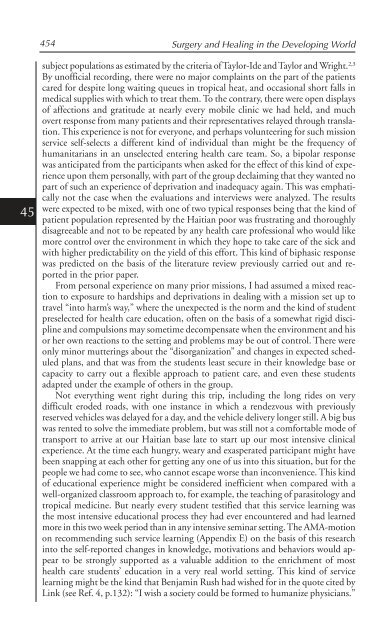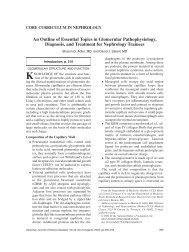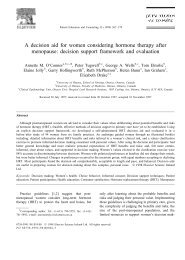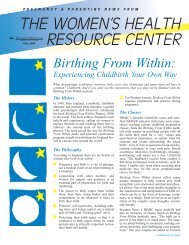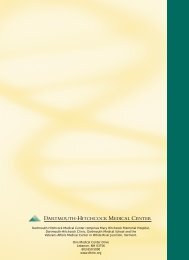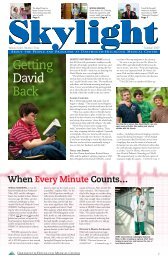Surgery and Healing in the Developing World - Dartmouth-Hitchcock
Surgery and Healing in the Developing World - Dartmouth-Hitchcock
Surgery and Healing in the Developing World - Dartmouth-Hitchcock
Create successful ePaper yourself
Turn your PDF publications into a flip-book with our unique Google optimized e-Paper software.
45<br />
454 <strong>Surgery</strong> <strong>and</strong> <strong>Heal<strong>in</strong>g</strong> <strong>in</strong> <strong>the</strong> Develop<strong>in</strong>g <strong>World</strong><br />
subject populations as estimated by <strong>the</strong> criteria of Taylor-Ide <strong>and</strong> Taylor <strong>and</strong> Wright. 2,3<br />
By unofficial record<strong>in</strong>g, <strong>the</strong>re were no major compla<strong>in</strong>ts on <strong>the</strong> part of <strong>the</strong> patients<br />
cared for despite long wait<strong>in</strong>g queues <strong>in</strong> tropical heat, <strong>and</strong> occasional short falls <strong>in</strong><br />
medical supplies with which to treat <strong>the</strong>m. To <strong>the</strong> contrary, <strong>the</strong>re were open displays<br />
of affections <strong>and</strong> gratitude at nearly every mobile cl<strong>in</strong>ic we had held, <strong>and</strong> much<br />
overt response from many patients <strong>and</strong> <strong>the</strong>ir representatives relayed through translation.<br />
This experience is not for everyone, <strong>and</strong> perhaps volunteer<strong>in</strong>g for such mission<br />
service self-selects a different k<strong>in</strong>d of <strong>in</strong>dividual than might be <strong>the</strong> frequency of<br />
humanitarians <strong>in</strong> an unselected enter<strong>in</strong>g health care team. So, a bipolar response<br />
was anticipated from <strong>the</strong> participants when asked for <strong>the</strong> effect of this k<strong>in</strong>d of experience<br />
upon <strong>the</strong>m personally, with part of <strong>the</strong> group declaim<strong>in</strong>g that <strong>the</strong>y wanted no<br />
part of such an experience of deprivation <strong>and</strong> <strong>in</strong>adequacy aga<strong>in</strong>. This was emphatically<br />
not <strong>the</strong> case when <strong>the</strong> evaluations <strong>and</strong> <strong>in</strong>terviews were analyzed. The results<br />
were expected to be mixed, with one of two typical responses be<strong>in</strong>g that <strong>the</strong> k<strong>in</strong>d of<br />
patient population represented by <strong>the</strong> Haitian poor was frustrat<strong>in</strong>g <strong>and</strong> thoroughly<br />
disagreeable <strong>and</strong> not to be repeated by any health care professional who would like<br />
more control over <strong>the</strong> environment <strong>in</strong> which <strong>the</strong>y hope to take care of <strong>the</strong> sick <strong>and</strong><br />
with higher predictability on <strong>the</strong> yield of this effort. This k<strong>in</strong>d of biphasic response<br />
was predicted on <strong>the</strong> basis of <strong>the</strong> literature review previously carried out <strong>and</strong> reported<br />
<strong>in</strong> <strong>the</strong> prior paper.<br />
From personal experience on many prior missions, I had assumed a mixed reaction<br />
to exposure to hardships <strong>and</strong> deprivations <strong>in</strong> deal<strong>in</strong>g with a mission set up to<br />
travel “<strong>in</strong>to harm’s way,” where <strong>the</strong> unexpected is <strong>the</strong> norm <strong>and</strong> <strong>the</strong> k<strong>in</strong>d of student<br />
preselected for health care education, often on <strong>the</strong> basis of a somewhat rigid discipl<strong>in</strong>e<br />
<strong>and</strong> compulsions may sometime decompensate when <strong>the</strong> environment <strong>and</strong> his<br />
or her own reactions to <strong>the</strong> sett<strong>in</strong>g <strong>and</strong> problems may be out of control. There were<br />
only m<strong>in</strong>or mutter<strong>in</strong>gs about <strong>the</strong> “disorganization” <strong>and</strong> changes <strong>in</strong> expected scheduled<br />
plans, <strong>and</strong> that was from <strong>the</strong> students least secure <strong>in</strong> <strong>the</strong>ir knowledge base or<br />
capacity to carry out a flexible approach to patient care, <strong>and</strong> even <strong>the</strong>se students<br />
adapted under <strong>the</strong> example of o<strong>the</strong>rs <strong>in</strong> <strong>the</strong> group.<br />
Not everyth<strong>in</strong>g went right dur<strong>in</strong>g this trip, <strong>in</strong>clud<strong>in</strong>g <strong>the</strong> long rides on very<br />
difficult eroded roads, with one <strong>in</strong>stance <strong>in</strong> which a rendezvous with previously<br />
reserved vehicles was delayed for a day, <strong>and</strong> <strong>the</strong> vehicle delivery longer still. A big bus<br />
was rented to solve <strong>the</strong> immediate problem, but was still not a comfortable mode of<br />
transport to arrive at our Haitian base late to start up our most <strong>in</strong>tensive cl<strong>in</strong>ical<br />
experience. At <strong>the</strong> time each hungry, weary <strong>and</strong> exasperated participant might have<br />
been snapp<strong>in</strong>g at each o<strong>the</strong>r for gett<strong>in</strong>g any one of us <strong>in</strong>to this situation, but for <strong>the</strong><br />
people we had come to see, who cannot escape worse than <strong>in</strong>convenience. This k<strong>in</strong>d<br />
of educational experience might be considered <strong>in</strong>efficient when compared with a<br />
well-organized classroom approach to, for example, <strong>the</strong> teach<strong>in</strong>g of parasitology <strong>and</strong><br />
tropical medic<strong>in</strong>e. But nearly every student testified that this service learn<strong>in</strong>g was<br />
<strong>the</strong> most <strong>in</strong>tensive educational process <strong>the</strong>y had ever encountered <strong>and</strong> had learned<br />
more <strong>in</strong> this two week period than <strong>in</strong> any <strong>in</strong>tensive sem<strong>in</strong>ar sett<strong>in</strong>g. The AMA-motion<br />
on recommend<strong>in</strong>g such service learn<strong>in</strong>g (Appendix E) on <strong>the</strong> basis of this research<br />
<strong>in</strong>to <strong>the</strong> self-reported changes <strong>in</strong> knowledge, motivations <strong>and</strong> behaviors would appear<br />
to be strongly supported as a valuable addition to <strong>the</strong> enrichment of most<br />
health care students’ education <strong>in</strong> a very real world sett<strong>in</strong>g. This k<strong>in</strong>d of service<br />
learn<strong>in</strong>g might be <strong>the</strong> k<strong>in</strong>d that Benjam<strong>in</strong> Rush had wished for <strong>in</strong> <strong>the</strong> quote cited by<br />
L<strong>in</strong>k (see Ref. 4, p.132): “I wish a society could be formed to humanize physicians.”


